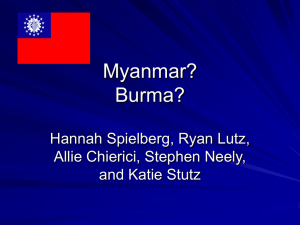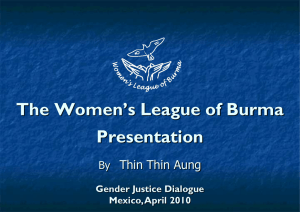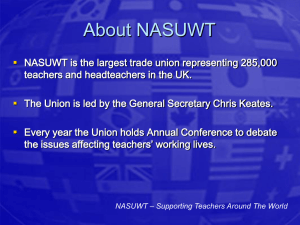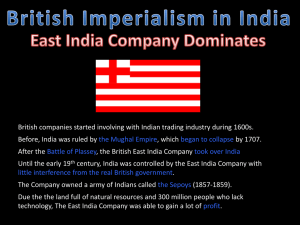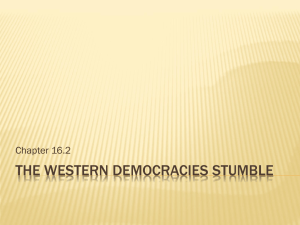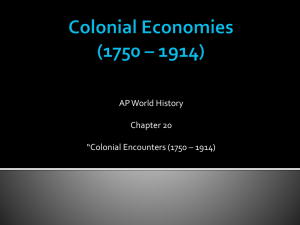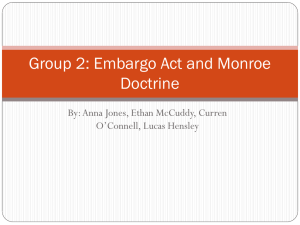Great Britain in Burma
advertisement
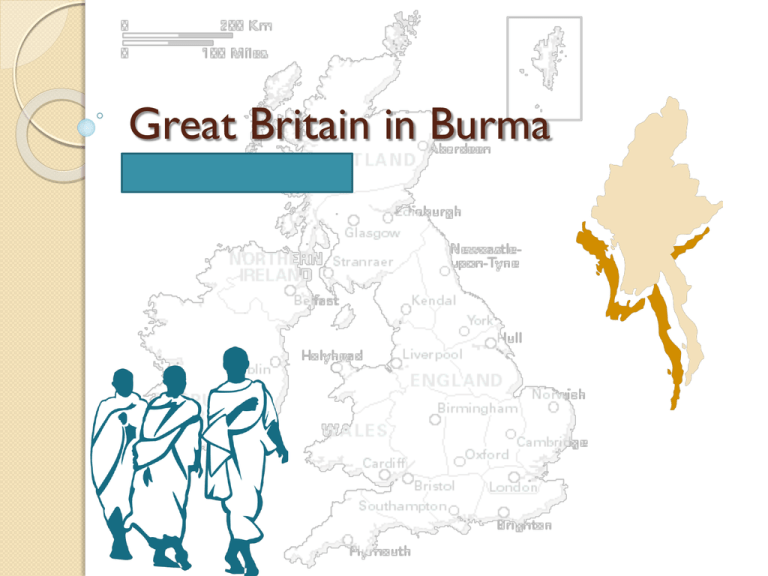
Great Britain in Burma By Rachel Wesley Before Imperialism- Myanmar India and China’s trade routes passed through Myanmar (Burma), therefore keeping the country wealthy ◦ Agriculture was more important than trade in economy ◦ Indian influence was popular through trade merchants First country to obtain Buddhism Government was centralized ◦ Ruled by one king who had checks on his power ◦ Broken down into categorized groups Before Imperialism (of Myanmar)Great Britain In the 1800’s,Great Britain was one of the most advanced nations ◦ Had the most colonies throughout the world Used colonies mostly for trade Competed with other nations Spread its global influence ◦ Was one of the nations involved in the Berlin Conference ◦ Had already established Direct Control in India Myanmar (Burma) is one of India’s neighboring countries Motives for Imperialism Great Britain was always in need of supplies to fuel the Industrial Revolutions’ products. ◦ Burma was in direct trade routes with China and India, (which was already colonized by Great Britain) ◦ Burma was rich in natural resources such as: Natural Gas Oil Tin Coal Silver and gold Gems (rubies) Large teak forests Fertile rice fields Anglo-Burmese Wars Britain’s “superiority” enabled them to take care of “weak” Burma Anglo-Burmese Wars First War ◦ Anglo-Burmese War (1824-1826) Konbaung Dynasty wanted to move into a territory close to a British colony in India Second War ◦ Anglo-Burmese War (1852) Britain wanted a teak forest in Southern Burma Third War ◦ Anglo-Burmese War (1885) British wanted the teak, oil, and rubies in northern Myanmar Blamed king for giving France more influence in country Outcome ◦ After winning all three wars, Britain had claimed most of Myanmar, eventually gaining the whole country Renamed Myanmar Burma Claimed it a province of India First Anglo-Burmese War, 1824-1826 Second Anglo-Burmese War, 1852 Third Anglo-Burmese War, 1885 British Imperialism During the Anglo-Burmese Wars Geopolitical Reasons: Burma’s western side is surrounded by the Bay of Bengal ◦ Easy access points by ship and harbors ◦ Creates good trade by other countries going to Burmese harbors Burma is also close to other major trade countries such as China, Thailand, India, and Nepal Burma had abundant teak forests and rice fields Economic Reasons: Burma had abundant natural resources ◦ Also in direct trade with China and India Britain would use the rice production and teak forests to support trade while taking Burma’s oil and rubies. Motives for Imperialism Nepal China Bhutan Bangladesh Burma India Laos Gulf of Tonkis Thailand Bay of Bengal Cambodia Vietnam Gulf of Thailand Indian Ocean Andaman Sea South China Sea Social Reasons Great Britain considered themselves to be superior to other “lesser” countries such as Burma ◦ Would help the “poor” Burmese ◦ Burma had a caste system Competition with other imperialist countries influenced the need for colonization Political Reasons Britain wanted to expand their empire in the growing world ◦ Other countries gaining territories put pressure on Britain Britain was already in multiple wars with Burma, and therefore had most of their land Burma had a strong, centralized government ruled by one leader ◦ An “easy target” Motives for Imperialism Methods of Imperialism Britain used the method of divide and rule by favoring some ethnic minorities over others. The better were treated with less repression. ◦ The Karen and Karenni were converted to Christianity and used to rule, the ethnic majority of Burmans were brutally oppressed. Used direct rule ◦ Abolished monarchy Separated church and state ◦ Secular Education system Founded schools teaching in both English and Burmese Also taught Christianity and frowned upon Buddhist teachings that were separate from English ways ◦ Burned villages and uprooted disloyal families ◦ Replaced them with trustworthy strangers Creative Writing Application We love England! We despise England! A letter from the Viceroy of India, Lord Northbrook, to the Secretary of State for India: "In dealing with the King of Burma, I have felt very strongly that it would not be creditable to us or right to do anything which might be interpreted to show a desire on our part to drive him into a corner and bring on a war... While I write and feel thus pacifically, I cannot avoid feeling also that the present condition of our relations with Burma will not be long maintained... and it is both possible and likely that... sufficient reason will be shown for our insisting upon so far modifying our treaty engagements with the King as to place him in the position of Cashmere, we undertaking to protect him against external attack, and requiring him to abstain from political relations with Foreign States, as well as to meet our views cordially about extension of trade.” This letter demonstrates Britain's attempts to make peace with the people of Burma. Although already having three wars with the Burmese, the British don’t want to create more violence and wish that they would strain from having other relations with other powers. Geopolitical Results Many Burmese migrated to the delta to get better soil quality and to support the demand for rice ◦ Shifted the population concentration Industrialization was introduced to Burma ◦ Railroads and steamboats were used for transportation Economic Results Britain gained access to Burma’s natural resources for trade ◦ To prepare the land for agricultural products, the Burmese had to borrow capital from others at high interest rates ◦ Opened to global trade whereas before, it was to just India and China The British bank wouldn’t allow mortgages All methods of transportation were owned by the British ◦ Burmese had to pay more to ship their goods People did not gain from the growing economy Advancements toward foreign trade hurt Burmese ◦ All the resources taken by Great Britain took away the supplies needed by the people before the take over Impact on Imperialized Burma A British official describing the lives of the Burmese in 1941 and how quickly they had to adapt to foreign trade: “Foreign landlordism and the operations of foreign moneylenders had led to an increasing exportation of a considerable proportion of the country’s resources and to the progressive impoverishment of the agriculturist and of the country as a whole….The peasant had grown factually poorer and unemployment had increased….The collapse of the Burmese social system led to a decay of the social conscience which, in the circumstances of poverty and unemployment caused a great increase in crime.” Social Results Britain had separated church and state ◦ Hurt Buddhist monks who were dependent on the monarchy ◦ The church had given the public a political education Burmese migration to delta caused a shift in population and changed the basis of wealth and power Many Indian laborers migrated to Burma, lowering the social standard ◦ Worked for cheaper prices ◦ Increase in Burmese unemployment ◦ Increase in Burma’s crime and a bad reputation for its people Political Results Great Britain abolished the monarchy ◦ The monarchy was given authority by the Buddhist organization Very few regulations in favor of the Burmese ◦ More so for the Indian immigrants Caused an increase in Burmese nationalism Impact on Imperialized Burma Resistance in Burma The Burmese resented both the British and the Indian immigrants ◦ Staged guerrilla warfare Led by former officers of the Burmese Royal Army ◦ Were often captured and brutally punished Burmese nationalism rose ◦ Educated Burmese led the revolution against the British ◦ Formed the Young Men’s Buddhist Association (YMBA) in 1906 Was not anti-government nor violent Established schools and boycotted British goods Thankin movement ◦ Radical movement that held country-wide semi-violent protests The End Credits Ernest Chew (1969). The Withdrawal of the Last British Residency from Upper Burma in 1879. Journal of Southeast Asian History, 10, pp 253-278 doi:10.1017/S0217781100004403 Furnivall, J. S. "Burma, Past and Present." Far Eastern Survey 22.3 (1953): 21-26. Print. Brännberg, Jonas. "A Potential Paradise Haunted by Poverty and War." Socialistworld.net. Workers' International, 25 Oct. 2004. Web. 19 Oct. 2010. <http://socialistworld.net/eng/2004/10/25burmab.html>. Bhattacharyya, Anindya. "Britain's Brutal Record of Imperialism in Burma|6Oct07|Socialist Worker." Socialist Worker (Britain) an Anticapitalist, Revolutionary Weekly. 2 Oct. 2007. Web. 18 Oct. 2010. <http://www.socialistworker.co.uk/art.php?id=13130>. "British Imperialism in Burma/Myanmar." Wikipedia, the Free Encyclopedia. WikiMedia, 16 Oct. 2010. Web. 20 Oct. 2010. <http://en.wikipedia.org/wiki/British_Imperialism_in_Burma/Myanma r>. Brooks, Ashley. "Burmese Imperialism Map." Map. Britannica. Wikimedia Commons, 4 Mar. 2010. Web. 21 Oct. 2010. <http://media2.web.britannica.com/eb-media/35/4035-004-4ECC016C.gif>.

